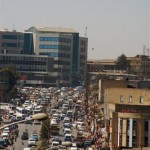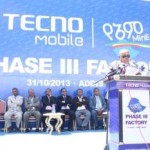 ADDIS ABABA, Apr 3 2014 (IPS) – For a while now, Magnetic Resonance Imaging or MRI scanners have typically been a luxury that both government and private hospitals in Ethiopia have struggled to afford to purchase for in-house use.
ADDIS ABABA, Apr 3 2014 (IPS) – For a while now, Magnetic Resonance Imaging or MRI scanners have typically been a luxury that both government and private hospitals in Ethiopia have struggled to afford to purchase for in-house use.
Addis Ababa, the Ethiopian capital with an ever-growing population of around 3.8 million, currently has only four stationary MRI scanners that provide services to 30 government and private hospitals, according to Zelalem Molla, a surgeon based in Addis Ababa.
Outside of the capital, only two MRI scanners exist. But the six scanners — in this Horn of Africa nation of some 92 million people — are old fashioned and far behind the technological curve in the West.
“It would be wrong to claim that the mobile MRI scanner would save lives,” says Zelalem, whose lunchtime chat with American entrepreneur Peter Burns III about the paucity of scanners sparked a business idea.
But, Zelalem notes, more MRI scanners — which use strong magnetic fields and radio waves to generate images of the inside of the body that can be analysed on computers — would crucially allow more doctors to diagnose illnesses far earlier when they are operable and potentially curable.
“Often it is not possible for doctors to diagnose illnesses such as tumours until they physically appear at a stage when the chances of saving a patient are slim — or it is too late,” Zelalem tells IPS.
However, actual figures about the number of people directly affected here by the lack of MRI scanners do not exist.
In the past, some Ethiopians have needed to travel to other African countries such as Kenya and South Africa, or to Europe to have scans. This even included Haile Gebrselassie, Ethiopia’s track runner, who used to go to Munich, Germany for scans to help diagnose running injuries.
Ethiopia technically has free healthcare for all, which is provided by government-run hospitals. The reality, however, is that “there are not enough hospitals and most suffer from inadequate staffing, budgets and machinery,” Zelalem says. Private hospitals exist but as an option affordable to very few Ethiopians.
And the cost of an MRI scan proffered privately is a frightening figure for most Ethiopians, many of whom earn between 500 to 1,000 birr (28 to 56 dollars) a month.
The scale of demand at government-run hospitals for free MRI scans means patients can be left with the choice of having to wait and risking their health, or raising funds to pay for a scan at a private hospital or institution.
Such gaps in Ethiopia’s healthcare are areas of concern to the government and many NGOs as three of the eight United Nations Millennium Development Goals (MDGs) for 2015 are healthcare focused, concentrating on reducing child mortality, improving maternal health as well as combatting HIV/AIDS, malaria and other diseases.




























Join Conversations